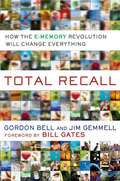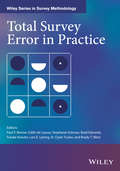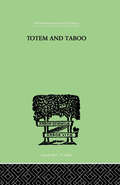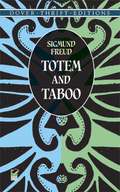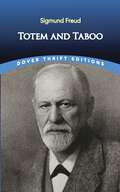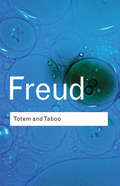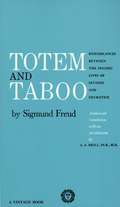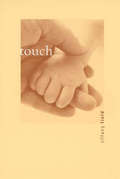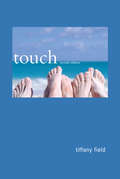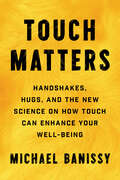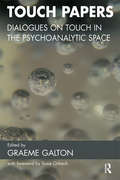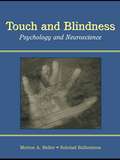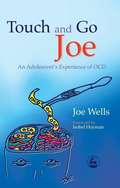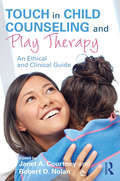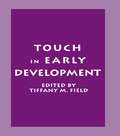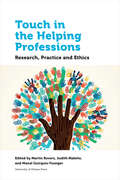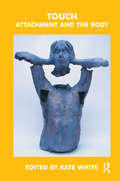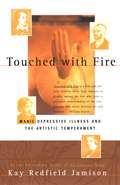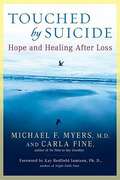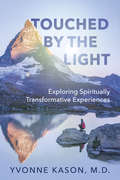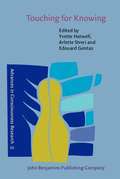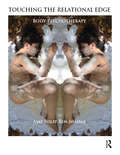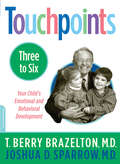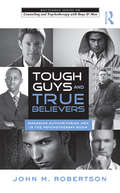- Table View
- List View
Total Recall: How the E-memory Revolution Will Change Everything
by Gordon Bell Jim GemmellIt will soon be possible to record, store, and recall everything one has ever seen, heard, read, or done. It's not science fiction; it will be the result of new innovations in memory and search technologies. Authors Bell (principal researcher, Microsoft Research) and Gemmell (senior researcher, Microsoft Research) illustrate the inevitability of the new technologies, entitled Total Recall, and how they will change lives and enable people to maintain their health, improve their education, and improve the quality of their work lives. The authors discuss the technologies and research, show readers how to begin creating their own e-memory with today's technology, and address potential drawbacks, such as piracy and ethics issues. Annotation c2010 Book News, Inc. , Portland, OR (booknews. com)
Total Survey Error in Practice: Improving Quality In The Era Of Big Data (Wiley Series In Survey Methodology Ser.)
by Frauke Kreuter Paul P. Biemer Edith De Leeuw Brad Edwards Brady T. West Lars E. Lyberg N. Clyde Tucker Stephanie EckmanFeaturing a timely presentation of total survey error (TSE), this edited volume introduces valuable tools for understanding and improving survey data quality in the context of evolving large-scale data sets This book provides an overview of the TSE framework and current TSE research as related to survey design, data collection, estimation, and analysis. It recognizes that survey data affects many public policy and business decisions and thus focuses on the framework for understanding and improving survey data quality. The book also addresses issues with data quality in official statistics and in social, opinion, and market research as these fields continue to evolve, leading to larger and messier data sets. This perspective challenges survey organizations to find ways to collect and process data more efficiently without sacrificing quality. The volume consists of the most up-to-date research and reporting from over 70 contributors representing the best academics and researchers from a range of fields. The chapters are broken out into five main sections: The Concept of TSE and the TSE Paradigm, Implications for Survey Design, Data Collection and Data Processing Applications, Evaluation and Improvement, and Estimation and Analysis. Each chapter introduces and examines multiple error sources, such as sampling error, measurement error, and nonresponse error, which often offer the greatest risks to data quality, while also encouraging readers not to lose sight of the less commonly studied error sources, such as coverage error, processing error, and specification error. The book also notes the relationships between errors and the ways in which efforts to reduce one type can increase another, resulting in an estimate with larger total error. This book: • Features various error sources, and the complex relationships between them, in 25 high-quality chapters on the most up-to-date research in the field of TSE • Provides comprehensive reviews of the literature on error sources as well as data collection approaches and estimation methods to reduce their effects • Presents examples of recent international events that demonstrate the effects of data error, the importance of survey data quality, and the real-world issues that arise from these errors • Spans the four pillars of the total survey error paradigm (design, data collection, evaluation and analysis) to address key data quality issues in official statistics and survey research Total Survey Error in Practice is a reference for survey researchers and data scientists in research areas that include social science, public opinion, public policy, and business. It can also be used as a textbook or supplementary material for a graduate-level course in survey research methods. Paul P. Biemer, PhD, is distinguished fellow at RTI International and associate director of Survey Research and Development at the Odum Institute, University of North Carolina, USA. Edith de Leeuw, PhD, is professor of survey methodology in the Department of Methodology and Statistics at Utrecht University, the Netherlands. Stephanie Eckman, PhD, is fellow at RTI International, USA. Brad Edwards is vice president, director of Field Services, and deputy area director at Westat, USA. Frauke Kreuter, PhD, is professor and director of the Joint Program in Survey Methodology, University of Maryland, USA; professor of statistics and methodology at the University of Mannheim, Germany; and head of the Statistical Methods Research Department at the Institute for Employment Research, Germany. Lars E. Lyberg, PhD, is senior advisor at Inizio, Sweden. N. Clyde Tucker, PhD, is principal survey methodologist at the American Institutes for Research, USA. Brady T. West, PhD, is research associate professor in the Survey Resea
Totem And Taboo: Some Points of Agreement between the Mental Lives of Savages and Neurotics
by Sigmund FreudThis is Volume IX of twenty-eight in the Psychoanalysis series. First published in 1950, the four essays comprised in this volume were originally published in the pages of the periodical Imago (Vienna) under the title 'Dber einige Obereinstimmungen im Seelenleben der Wilden und der Neurotiker'.
Totem and Taboo
by Sigmund FreudThis landmark collection of essays by the father of psychoanalysis explores the conflict between primitive feelings and the demands of civilization. Freud identifies a strong unconscious inclination as the basis of taboo, a forbidden behavior, and traces its earliest appearance to the childhood development of totemism.
Totem and Taboo: Resemblances Between The Psychic Lives Of Savages And Neurotics (Dover Thrift Editions)
by Sigmund FreudTotem and Taboo is a collection of four essays first published in the journal Imago (1912–13) employing the application of psychoanalysis to the fields of archaeology, anthropology, and the study of religion: "The Horror of Incest"; "Taboo and Emotional Ambivalence"; "Animism, Magic and the Omnipotence of Thoughts"; and "The Return of Totemism in Childhood".
Totem and Taboo: Resemblances Between The Psychic Lives Of Savages And Neurotics (Routledge Classics #0)
by Sigmund FreudWidely acknowledged to be one of Freud's greatest cultural works, when Totem and Taboo was first published in 1913, it caused outrage. Thorough and thought-provoking, Totem and Taboo remains the fullest exploration of Freud's most famous themes. Family, society, religion - they're all put on the couch here. Whatever your feelings about psychoanalysis, Freud's theories have influenced every facet of modern life, from film and literature to medicine and art. If you don't know your incest taboo from your Oedipal complex, and you want to understand more about the culture we're living in, then Totem and Taboo is the book to read.
Totem and Taboo: Resemblances Between the Psychic Lives of Savages and Neurotics
by Sigmund FreudReprints a translation by A. A. Brill, which was originally published in 1918 (Dodd, Mead & Company). Freud's classic work applies psychoanalysis to aboriginals, paralleling aboriginal practice and neurotic patterns of behavior. For example, Freud compares aboriginal incest taboos with scrupulous rituals of compulsion neurotics who, Freud finds, also wrestle with incest taboos. Culture is itself theorized as a reaction-formation to taboos prohibiting potentially destructive social behavior. Annotation c. Book News, Inc. , Portland, OR (booknews. com)
Touch
by Tiffany FieldAn essay on the importance of touch to children's growth and development and to the physical and mental well-being of people of all ages. The first sensory input in life comes from the sense of touch while a baby is still in the womb, and touch continues to be the primary means of learning about the world throughout infancy, well into childhood. Touch is critical for children's growth, development, and health, as well as for adults' physical and mental well-being. Yet American society, claims Tiffany Field, is dangerously touch-deprived.Field, a leading authority on touch and touch therapy, begins this accessible book with an overview of the sociology and anthropology of touching and the basic psychophysical properties of touch. She then reports recent research results on the value of touch therapies, such as massage therapy, for various conditions, including asthma, cancer, autism, and eating disorders. She emphasizes the need for a change in societal attitudes toward touching, particularly among those who work with children.
Touch
by Tiffany FieldWhy we need a daily dose of touch: an investigation of the effects of touch on our physical and mental well-being. Although the therapeutic benefits of touch have become increasingly clear, American society, claims Tiffany Field, is dangerously touch-deprived. Many schools have “no touch” policies; the isolating effects of Internet-driven work and life can leave us hungry for tactile experience. In this book Field explains why we may need a daily dose of touch. The first sensory input in life comes from the sense of touch while a baby is still in the womb, and touch continues to be the primary means of learning about the world throughout infancy and well into childhood. Touch is critical, too, for adults' physical and mental health. Field describes studies showing that touch therapy can benefit everyone, from premature infants to children with asthma to patients with conditions that range from cancer to eating disorders. This second edition of Touch, revised and updated with the latest research, reports on new studies that show the role of touch in early development, in communication (including the reading of others' emotions), in personal relationships, and even in sports. It describes the physiological and biological effects of touch, including areas of the brain affected by touch, and the effects of massage therapy on prematurity, attentiveness, depression, pain, and immune functions. Touch has been shown to have positive effects on growth, brain waves, breathing, and heart rate, and to decrease stress and anxiety. As Field makes clear, we enforce our society's touch taboo at our peril.
Touch Matters: Handshakes, Hugs, and the New Science on How Touch Can Enhance Your Well-Being
by Michael BanissyAn exploration of the new science behind our most underappreciated sense and why we need to harness the power of touch for our health and well-being.Every day, we use our sense of touch to navigate the world. A handshake, a pat on the shoulder, a hug—all essential touches that make up our daily lives. In Touch Matters, Professor Michael Banissy brings together diverse scientific insights from the world's largest study on touch with takeaways on how to enhance your levels of touch for a happier, healthier life. The book explains why touch is essential to our well-being, the role it plays in our relationships, friendships, in the bedroom, workplace, in team activities such as sports, and much more. Banissy's latest research explores:Our "touch personalities"Touch starvationHow touch defines our relationships and self-esteemThe impact of touch on our physical and mental health This is a fascinating window into one of our most important and basic senses and how to harness its power.FEATURES ORIGINAL RESEARCH FROM "THE TOUCH TEST": Touch Matters is based on one of Banissy's most recent projects—the Touch Test—a science and broadcast collaboration with the BBC and Wellcome Collection. This project explored attitudes and experiences of touch via the world's largest contemporary survey on the topic, public exhibitions, and a series of broadcast programs focused on the topic of touch that received worldwide attention. The project had approximately 40,000 participants from 113 countries.OFFERS GUIDANCE ON COMMUNICATING AND CONNECTING IN OUR DAILY AND PROFESSIONAL LIVES: As we return to office work and live in a world where touch has become loaded with meaning, this book will help people understand how important touch is and the role it plays in every aspect of our lives, from relationships and friendships to the workplace and team activities and much more.Perfect for:Readers interested in science, psychology, and self-helpFans of James Nestor's Breath, Marc Brackett's Permission to Feel, Bill Bryson's The Body, Mark Miodownik's Stuff MattersAdults and parents of children resuming in-person activities including going back to the office, returning to school, traveling, and socializingThose interested in learning more about the science of touch, touch starvation, and how important touch is to child/human developmentPeople struggling with depression or anxiety around physical contact
Touch Papers: Dialogues on Touch in the Psychoanalytic Space
by Graeme GaltonFor the first time, the controversial issue of physical contact in the consulting room is explored by distinguished psychoanalysts and psychotherapists representing a diverse range of psychoanalytic viewpoints. The contributors focus on the unconscious meanings of touch, or absence of touch, or unwelcome touch, or accidental touch in the psychoanalytic clinical situation. There are plenty of clinical vignettes and the discussions are grounded in clinical experience. Out of all medical and therapeutic treatments, psychoanalysis remains one of the very few that uses no physical contact. Sigmund Freud stopped using the 'pressure technique' in the late 1890s, a technique whereby he would press lightly on his patient's head while insisting that they remembered forgotten events. He gave up this procedure in favour of encouraging free association, then listening and interpreting without touching his patient in any way. Psychoanalysis was born and the use of touch, as a technique reminiscent of hypnosis, was explicitly prohibited. The avoidance of physical contact between the analyst and patient was established as a key component of the classical rule of abstinence.
Touch and Blindness: Psychology and Neuroscience
by Morton A. Heller Soledad BallesterosResearch on touch and blindness has undergone rapid transformation in recent years, with dramatic developments in technology designed to provide assistance to those who are blind, and advancements in robotics that demand haptic interfaces. Touch and Blindness approaches the study of the topic from the perspectives of psychological methodology and the most sophisticated, state-of-the-art techniques in neuroscience. This book, edited by well-known leaders in the field, is derived from the discussions presented by speakers at a conference held in 2002, and presents current research in the field. The book is arranged in a logical, disciplinary fashion, first discussing touch and blindness from a psychological perspective, followed by an examination from the perspective of neuroscience. Some specific topics include:*processing spatial information from touch and movement;*form, projection, and pictures for the blind;*neural substrate and visual and tactile object representations; and*the role of visual cortex in tactile processing. Touch and Blindness is ideal for researchers in psychology and neuroscience, medicine, and special education.
Touch and Go Joe: An Adolescent's Experience of OCD
by Joe WellsPart of the Reading Well scheme. 35 books selected by young people and health professionals to provide 13 to 18 year olds with high-quality support, information and advice about common mental health issues and related conditions. As many as 2 in every 100 people suffer from Obsessive-Compulsive Disorder (OCD), and 16-year-old Joe Wells is one of them. In Touch and Go Joe, he tells the story of his battle with OCD from its insidious beginnings at age 9 and increasingly intrusive symptoms, to diagnosis at age 12. Having struggled to keep the condition a secret for years, he is now able to talk and write openly about OCD and how he battled to overcome it. This book is packed with advice and coping strategies, as well as first-hand accounts of available treatments such as cognitive behavioural therapy and medication. Written in an informal and accessible style, and including his own humorous illustrations, Touch and Go Joe gives an upbeat yet realistic look at the effect of OCD on adolescent life. This honest and amusing account will raise awareness of this all-too-common, yet frequently misdiagnosed disorder and will be of interest to anyone who has suffered from or knows someone who has suffered from OCD, including children and adolescents, teachers, psychologists, psychiatrists, mental health professionals, parents and carers.
Touch in Child Counseling and Play Therapy: An Ethical and Clinical Guide
by Janet A. Courtney Robert D. NolanTouch in Child Counseling and Play Therapy explores the professional and legal boundaries around physical contact in therapy and offers best-practice guidelines from a variety of perspectives. Chapters address issues around appropriate and sensitive therapist-initiated touch, therapeutic approaches that use touch as an intervention in child treatment, and both positive and challenging forms of touch that are initiated by children. In these pages, professionals and students alike will find valuable information on ways to address potential ethical dilemmas, including defining boundaries, working with parents and guardians, documentation, consent forms, cultural considerations, countertransference, and much more.
Touch in Early Development
by Tiffany M. FieldA symposium titled, "Touch in Infancy" was held to celebrate the opening of the first Touch Research Institute in the world. Although touch is the largest sense organ in the body, it is the one that had been the most neglected and the only one to just recently have a research institute. Designed to conduct basic research on touch and on the skin, the institute will work with wellness programs such as massage therapy and other kinds of touch therapies to facilitate better health and to treat various diseases. The institute's opening symposium featured presentations from several of the world's leading experts in infant development. Published in this volume, their work addresses the relevance of touch to the neonate's well-being.
Touch in the Helping Professions: Research, Practice and Ethics (Health and Society)
by Martin Rovers, Judith Malette and Manal Guirguis-YoungerTouch may well be one of the least understood or talked about subjects in the helping professions. A discussion on the importance and ethics of positive, caring, and appropriate touch in professions such as teaching, nursing and counselling is long overdue. Touch in the Helping Professions delivers just that, weaving together scholarly evidence, research and clinical practice from a wide range of perspectives encompassing philosophy, theology, psychology, and anthropology to challenge assumptions about the role of touch in the helping professions. The contributors to the volume focus not only on the overarching roles of gender, age, culture and life experience, but go beyond to encompass canine-assisted therapy, touch deprivation, sacred objects, as well as key ethical considerations. The prevailing lack of dialogue, due to fear of contravening ethical boundaries, has stood in the way of an open and responsible discussion on the use of touch in therapy. Touch in the Helping Professions is a welcome and much needed contribution to the field—a window onto a fundamental need. This book is published in English. - Cet ouvrage offre un ensemble de données probantes et de résultats cliniques à l’appui du toucher dans le développement physique et émotionnel. Il est structuré selon trois axes : la théorie sur le toucher; la pratique du toucher dans un contexte de thérapie, et les questions éthiques. Il aborde la question du rôle du genre, de l’âge, de la culture et de l’expérience de vie, des sujets comme la zoothérapie, la privation sensorielle, des objets sacrés, et des considérations d’ordre éthique. Les approches variées – philosophie, théologie, psychologie, anthropologie – remettent en question les présuppositions, offrent un contexte historico-culturelprofessionnel, et font appel à des données primaires. Les collaborateurs soutiennent que le toucher sain et non sexuel n’est pas suffisamment enseigné dans le cadre de la formation professionnelle. Cette absence de dialogue – engendrée par la crainte de dépasser des bornes éthiques, fait en sorte qu’une discussion ouverte et responsable sur l’utilisation du toucher dans un cadre thérapeutique ne peut avoir lieu, alors même qu’elle contribuerait aux balises théoriques de notre compréhension de cet enjeu fondamental. Ce livre est publié en anglais.
Touch: Attachment and the Body (The Bowlby Centre Monograph Series)
by Kate WhiteThis book compiles the papers presented at John Bowlby Memorial Conference 2003, exploring the complex and interwoven themes of touch, attachment and the body and their emergence in clinical work. It offers a new theory of the body, and of the role of the body in psychoanalytical practice.
Touched With Fire: Manic-Depressive Illness and the Artistic Temperament
by Kay Redfield JamisonThe definitive work on the profound and surprising links between manic-depression and creativity, from the bestselling psychologist of bipolar disorders who wrote An Unquiet Mind.One of the foremost psychologists in America, “Kay Jamison is plainly among the few who have a profound understanding of the relationship that exists between art and madness” (William Styron). The anguished and volatile intensity associated with the artistic temperament was once thought to be a symptom of genius or eccentricity peculiar to artists, writers, and musicians. Her work, based on her study as a clinical psychologist and researcher in mood disorders, reveals that many artists subject to exalted highs and despairing lows were in fact engaged in a struggle with clinically identifiable manic-depressive illness. Jamison presents proof of the biological foundations of this disease and applies what is known about the illness to the lives and works of some of the world's greatest artists including Lord Byron, Vincent Van Gogh, and Virginia Woolf.
Touched by Suicide: Hope and Healing After Loss
by Carla Fine Michael F. MyersWhether you are struggling with fresh grief at a loved one's death by suicide or your loss happened years ago, you should know that you are not alone. 5 million Americans are affected--directly or indirectly--by this tragedy each year. And it sends us on a lifelong search for answers, both to the practical questions and the deepest question of all: Why? In this definitive guide book, Michael F. Myers, MD, a leading psychiatrist, and Carla Fine, author of the acclaimed No Time to Say Goodbye: Surviving the Suicide of a Loved One, combine their perspectives as a physician and a survivor to offer compassionate and practical advice to anyone affected by suicide.
Touched by the Light: Exploring Spiritually Transformative Experiences
by Yvonne KasonHow Peak Spiritual Experiences Transform Lives Today Dr. Yvonne Kason’s life was touched by five Near-Death experiences (NDEs), the most recent in 2003. Her dramatic Near-Death Experience in a 1979 plane crash propelled her as a young medical doctor to research and counsel people with diverse types of peak spiritual experiences. In 1994, she coined the now widely used phrase “Spiritually Transformative Experiences” (STEs). These include Near-Death Experiences, mystical experiences, spiritual energy or kundalini awakenings, diverse psychic experiences, and inspired creativity. Touched by the Light is a synthesis of forty years of Dr. Kason's research on STEs and their profound after-effects on body, mind, and spirit. Filled with fascinating case studies, Touched By the Light is inspiring to all, as well as a practical guide for those experiencing STEs and their counsellors.
Touching for Knowing
by Yvette Hatwell Arlette Streri Edouard GentazA number of articles exploring ways people learn. Learning through touch instead of vision is contrasted.
Touching the Holy: Ordinariness, Self Esteem, and Friendship
by Robert J. WicksThis repackaged edition of noted psychologist Robert J. Wicks's most popular book encourages readers to share and receive that sacred presence more openly, especially through the gift of friendship. The book's enduring popularity is due in part to its practicality: principles of self-respect, skills for stress management, and more. Also includes a new introduction by Wicks.
Touching the Relational Edge: Body Psychotherapy
by Asaf Rolef Ben-ShaharThis book introduces body psychotherapy to psychologists, psychotherapists, and interested others through an attachment based, object relations, and primarily psychoanalytic and relational framework. It approaches body psychotherapy through historical, theoretical and clinical perspectives.
Touchpoints Three to Six
by T. Berry Brazelton Joshua D. SparrowFor decades, new parents have relied on Dr. Brazelton's wisdom. But all "Brazelton babies" grow up. Now at last, the internationally famous pediatrician, in collaboration with an eminent child psychiatrist, has brought his unique insights to the "magic" preschool and first-grade years. Through delightful profiles of four very different children, the authors apply the touchpoints theory (following the pattern of growth-new challenge-reegression-recharging-and renewed growth) to each of the great cognitive, behavioral, and emotional leaps that occur from age three to six. In the second, alphabetical, half of the book they offer precious guidance to parents facing contemporary pressures and stresses, such as how to keep a child safe without instilling fear, countering the electronic barrage of violent games and marketing aimed at children, coping successfully with varied family configurations, over-scheduling, competition, and many other vital issues today. A Merloyd Lawrence Book
Tough Guys and True Believers: Managing Authoritarian Men in the Psychotherapy Room (The Routledge Series on Counseling and Psychotherapy with Boys and Men)
by John M. RobertsonSome men are especially difficult to manage in the psychotherapy room. They are controlling, exploitive, rigid, aggressive, and prejudiced. In a word, they are Authoritarian. This book is a guide for therapists and counselors who work with these men, offering an understanding of their psychological development and providing empirically supported recommendations to work with them effectively. In the first part, Robertson describes several versions of authoritarian men. Some are Tough Guys (workplace bullies, abusive partners, sexual harassers), and others are True Believers (men who use religion to justify their authoritarian behavior). Robertson draws from a diverse literature in psychology, sociology, men’s studies, and neurobiology to describe the developmental histories and personalities of these men. Part two offers practical and specific strategies to assess and treat these wounded men—developing a masculine friendly alliance, respecting their personal and religious beliefs, and teaching them self-awareness and self-regulation skills. Throughout, Robertson emphasizes a reality that many therapists doubt: Some authoritarian men want to change their behavior, and are capable of doing so. This book presents an empathic and respectful view of a group of men too often written off as unmanageable and unchangeable.
